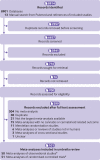Balancing risks and benefits of cannabis use: umbrella review of meta-analyses of randomised controlled trials and observational studies
- PMID: 37648266
- PMCID: PMC10466434
- DOI: 10.1136/bmj-2022-072348
Balancing risks and benefits of cannabis use: umbrella review of meta-analyses of randomised controlled trials and observational studies
Abstract
Objective: To systematically assess credibility and certainty of associations between cannabis, cannabinoids, and cannabis based medicines and human health, from observational studies and randomised controlled trials (RCTs).
Design: Umbrella review.
Data sources: PubMed, PsychInfo, Embase, up to 9 February 2022.
Eligibility criteria for selecting studies: Systematic reviews with meta-analyses of observational studies and RCTs that have reported on the efficacy and safety of cannabis, cannabinoids, or cannabis based medicines were included. Credibility was graded according to convincing, highly suggestive, suggestive, weak, or not significant (observational evidence), and by GRADE (Grading of Recommendations, Assessment, Development and Evaluations) (RCTs). Quality was assessed with AMSTAR 2 (A Measurement Tool to Assess Systematic Reviews 2). Sensitivity analyses were conducted.
Results: 101 meta-analyses were included (observational=50, RCTs=51) (AMSTAR 2 high 33, moderate 31, low 32, or critically low 5). From RCTs supported by high to moderate certainty, cannabis based medicines increased adverse events related to the central nervous system (equivalent odds ratio 2.84 (95% confidence interval 2.16 to 3.73)), psychological effects (3.07 (1.79 to 5.26)), and vision (3.00 (1.79 to 5.03)) in people with mixed conditions (GRADE=high), improved nausea/vomit, pain, spasticity, but increased psychiatric, gastrointestinal adverse events, and somnolence among others (GRADE=moderate). Cannabidiol improved 50% reduction of seizures (0.59 (0.38 to 0.92)) and seizure events (0.59 (0.36 to 0.96)) (GRADE=high), but increased pneumonia, gastrointestinal adverse events, and somnolence (GRADE=moderate). For chronic pain, cannabis based medicines or cannabinoids reduced pain by 30% (0.59 (0.37 to 0.93), GRADE=high), across different conditions (n=7), but increased psychological distress. For epilepsy, cannabidiol increased risk of diarrhoea (2.25 (1.33 to 3.81)), had no effect on sleep disruption (GRADE=high), reduced seizures across different populations and measures (n=7), improved global impression (n=2), quality of life, and increased risk of somnolence (GRADE=moderate). In the general population, cannabis worsened positive psychotic symptoms (5.21 (3.36 to 8.01)) and total psychiatric symptoms (7.49 (5.31 to 10.42)) (GRADE=high), negative psychotic symptoms, and cognition (n=11) (GRADE=moderate). In healthy people, cannabinoids improved pain threshold (0.74 (0.59 to 0.91)), unpleasantness (0.60 (0.41 to 0.88)) (GRADE=high). For inflammatory bowel disease, cannabinoids improved quality of life (0.34 (0.22 to 0.53) (GRADE=high). For multiple sclerosis, cannabinoids improved spasticity, pain, but increased risk of dizziness, dry mouth, nausea, somnolence (GRADE=moderate). For cancer, cannabinoids improved sleep disruption, but had gastrointestinal adverse events (n=2) (GRADE=moderate). Cannabis based medicines, cannabis, and cannabinoids resulted in poor tolerability across various conditions (GRADE=moderate). Evidence was convincing from observational studies (main and sensitivity analyses) in pregnant women, small for gestational age (1.61 (1.41 to 1.83)), low birth weight (1.43 (1.27 to 1.62)); in drivers, car crash (1.27 (1.21 to 1.34)); and in the general population, psychosis (1.71 (1.47 to 2.00)). Harmful effects were noted for additional neonatal outcomes, outcomes related to car crash, outcomes in the general population including psychotic symptoms, suicide attempt, depression, and mania, and impaired cognition in healthy cannabis users (all suggestive to highly suggestive).
Conclusions: Convincing or converging evidence supports avoidance of cannabis during adolescence and early adulthood, in people prone to or with mental health disorders, in pregnancy and before and while driving. Cannabidiol is effective in people with epilepsy. Cannabis based medicines are effective in people with multiple sclerosis, chronic pain, inflammatory bowel disease, and in palliative medicine but not without adverse events.
Study registration: PROSPERO CRD42018093045.
Funding: None.
© Author(s) (or their employer(s)) 2019. Re-use permitted under CC BY-NC. No commercial re-use. See rights and permissions. Published by BMJ.
Conflict of interest statement
Competing interests: All authors have completed the ICMJE uniform disclosure form at www.icmje.org/disclosure-of-interest/ and declare: MS received honoraria/has been a consultant for AbbVie, Angelini, Lundbeck, Otsuka. DC has received grant monies for research from Eli Lilly, Janssen Cilag, Roche, Allergen, Bristol-Myers Squibb, Pfizer, Lundbeck, Astra Zeneca, Hospira; Travel Support and Honoraria for Talks and Consultancy from Eli Lilly, Bristol-Myers Squibb, Astra Zeneca, Lundbeck, Janssen Cilag, Pfizer, Organon, Sanofi-Aventis, Wyeth, Hospira, Servier, Seqirus; and is a current or past Advisory Board Member for Lu AA21004: Lundbeck; Varenicline: Pfizer; Asenapine: Lundbeck; Aripiprazole LAI: Lundbeck; Lisdexamfetamine: Shire; Lurasidone: Servier; Brexpiprazole: Lundbeck; Treatment Resistant Depression: LivaNova; Cariprazine: Seqirus. He is founder of the Optimal Health Program, currently operating as Optimal Health Australia; and is part owner of Clarity Healthcare. He is on the scientific advisory of The Mental Health Foundation of Australia. He does not knowingly have stocks or shares in any pharmaceutical company. EV has received grants and served as consultant, advisor or CME speaker for the following entities: AB-Biotics, AbbVie, Angelini, Biogen, Boehringer-Ingelheim, Celon Pharma, Dainippon Sumitomo Pharma, Ferrer, Gedeon Richter, GH Research, Glaxo-Smith Kline, Janssen, Lundbeck, Novartis, Orion Corporation, Organon, Otsuka, Sage, Sanofi-Aventis, Sunovion, Takeda, and Viatris, outside of the submitted work. CUC has been a consultant or advisor to or have received honoraria from: AbbVie, Acadia, Alkermes, Allergan, Angelini, Aristo, Boehringer-Ingelheim, Cardio Diagnostics, Cerevel, CNX Therapeutics, Compass Pathways, Darnitsa, Gedeon Richter, Hikma, Holmusk, IntraCellular Therapies, Janssen/Johnson & Johnson, Karuna, LB Pharma, Lundbeck, MedAvante-ProPhase, MedInCell, Merck, Mindpax, Mitsubishi Tanabe Pharma, Mylan, Neurocrine, Newron, Noven, Otsuka, Pharmabrain, PPD Biotech, Recordati, Relmada, Reviva, Rovi, Seqirus, SK Life Science, Sunovion, Sun Pharma, Supernus, Takeda, Teva, and Viatris. He provided expert testimony for Janssen and Otsuka. He served on a Data Safety Monitoring Board for Lundbeck, Relmada, Reviva, Rovi, Supernus, and Teva. He has received grant support from Janssen and Takeda. He received royalties from UpToDate and is also a stock option holder of Cardio Diagnostics, Mindpax, and LB Pharma.
Figures





Comment in
-
Benefits and risks of cannabinoids.BMJ. 2023 Sep 18;382:2113. doi: 10.1136/bmj.p2113. BMJ. 2023. PMID: 37722728 No abstract available.
References
-
- ElSohly MA, Slade D. Chemical constituents of marijuana: The complex mixture of natural cannabinoids. In: Life Sciences. Life Sci, 2005: 539-48. - PubMed
Publication types
MeSH terms
Substances
LinkOut - more resources
Full Text Sources
Medical
